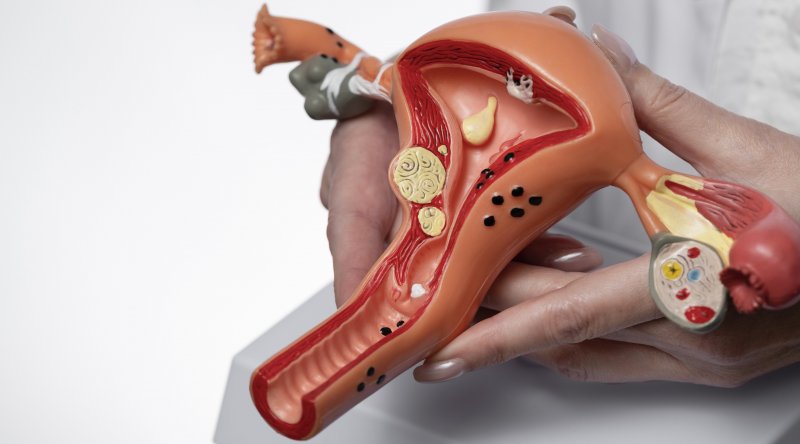
03.08.2025
Endometrial Cancer: Symptoms, Diagnosis, Treatment & Advanced Care at RecMed Medical Travel
1. What Is Endometrial Cancer?
Endometrial cancer originates in the lining of the uterus (endometrium) and is the most common gynecological malignancy in developed countries. It most often affects postmenopausal women, but can also occur earlier, especially in those with genetic predispositions.
At RecMed Medical Travel, we connect patients with Turkey’s leading cancer centers and specialists for advanced, personalized care across all stages of endometrial cancer.
2. Causes and Risk Factors
Several risk factors contribute to the development of endometrial cancer, primarily hormonal imbalances—especially excess estrogen. Other major risk factors include:
• Obesity
• Polycystic ovary syndrome (PCOS)
• Diabetes
• Early menstruation or late menopause
• Hormone replacement therapy (estrogen-only)
• Use of tamoxifen for breast cancer
• Family history of endometrial or colorectal cancer (e.g., Lynch Syndrome)
Reference: American Cancer Society – Risk Factors for Endometrial Cancer
https://www.cancer.org/cancer/endometrial-cancer/causes-risks-prevention/risk-factors.html
3. Symptoms of Endometrial Cancer
Early detection is common due to prominent symptoms. Common signs include:
• Vaginal bleeding after menopause
• Heavy or prolonged periods (premenopausal women)
• Pelvic pain or discomfort
• Unusual vaginal discharge
• Pain during sexual intercourse
• Unexplained weight loss
Postmenopausal bleeding should never be ignored and requires prompt evaluation.
4. Types and Stages
Types:
• Type I (Endometrioid adenocarcinoma): Estrogen-dependent and more common
• Type II (Serous, clear cell, carcinosarcoma): Non-estrogen dependent and more aggressive
Stages (FIGO System):
• Stage I: Confined to the uterus
• Stage II: Invasion of cervical stroma
• Stage III: Spread to pelvic tissues or lymph nodes
• Stage IV: Involvement of bladder, bowel, or distant organs
5. Diagnosis and Staging
RecMed provides access to cutting-edge diagnostics for accurate staging and personalized treatment planning:
• Gynecological examination
• Transvaginal ultrasound
• Endometrial biopsy
• Hysteroscopy
• MRI or CT scan (MRI is preferred for radiation-sensitive patients such as those with Lynch Syndrome)
• Molecular and genetic profiling
Reference: National Cancer Institute – Endometrial Cancer Diagnosis
https://www.cancer.gov/types/uterine/patient/endometrial-treatment-pdq
6. Treatment Options
Treatment plans are customized based on cancer type, stage, and patient factors. RecMed facilitates multidisciplinary treatment programs with the latest evidence-based methods.
Surgery
• Total hysterectomy
• Bilateral salpingo-oophorectomy
• Lymph node dissection
Radiotherapy
• External beam radiation therapy (EBRT)
• Brachytherapy (internal radiation)
Chemotherapy
• Typically used for advanced or recurrent disease
• Common regimen: Carboplatin + Paclitaxel
Immunotherapy
• Indicated for patients with dMMR or MSI-high tumors
• Dostarlimab (Jemperli) is FDA-approved for eligible cases
Targeted Therapy
• Based on molecular markers (e.g., HER2, PI3K, KRAS mutations)
Complementary Phytotherapy
• Natural support therapies to strengthen the immune system, reduce inflammation, and improve overall treatment tolerance
Reference: FDA – Approval of Dostarlimab for Endometrial Cancer
https://www.fda.gov/drugs/resources-information-approved-drugs/dostarlimab-endometrial-cancer
7. Comprehensive Genetic and Molecular Testing at RecMed
RecMed offers a complete portfolio of genetic and molecular tests to support personalized oncology. These tests are essential for:
• Confirming hereditary syndromes (e.g., Lynch Syndrome)
• Identifying actionable mutations for targeted and immunotherapies
• Predicting recurrence and prognosis
• Tailoring individualized treatment plans
Our offerings include (but are not limited to):
• Next-Generation Sequencing (NGS) panels
• MSI and MMR testing
• OncoDeep® molecular profiling
• OncoMine™ Comprehensive Assay
• Oncotype DX for recurrence risk stratification
• Whole Exome and Genome Sequencing
• BRCA1/2 and TP53 testing
• Custom gene panels for gynecologic cancers
All tests are conducted through accredited international laboratories or certified centers in Turkey with fast turnaround and full interpretation support.
Reference: NCCN Guidelines – Uterine Neoplasms
https://www.nccn.org/professionals/physician_gls/pdf/uterine.pdf
8. Why RecMed Is the Right Choice
Patients choose RecMed Medical Travel for:
• Expert oncology coordination, led by specialists such as Assoc. Prof. Dr. Mustafa Ozturk, Medical Oncologist
• Minimally invasive and robotic-assisted surgery options
• Access to advanced immunotherapy and genetic profiling
• Integrated services including translation, accommodation, and personal case managers
• Collaboration with Turkey’s leading JCI-accredited hospitals
9. Prognosis and Outcomes
Prognosis depends on the stage, histological type, genetic profile, and response to treatment.
• Stage I endometrial cancer has a 5-year survival rate of over 90%
• Advanced stages require complex multimodal therapy but may still offer long-term remission when personalized appropriately
Ongoing follow-up is crucial for early detection of recurrence and managing long-term effects.
10. Follow-Up and Recovery
Patients benefit from a structured post-treatment program:
• Regular follow-ups every 3–6 months for the first 2 years
• Annual follow-up visits after that
• Imaging and blood tests as clinically indicated
• Hormonal support or rehabilitation if needed
• Nutritional and lifestyle counseling
RecMed ensures a seamless continuum of care from initial consultation to survivorship.
11. Contact RecMed Medical Travel
📞 Let’s Start Your Personalized Endometrial Cancer Journey
Our international team is ready to review your reports and design a treatment plan tailored to your needs.
• 🌐 Website: www.recmedmedical.net
• 📧 Email: [email protected]
• 📱 WhatsApp: +90 532 135 08 72